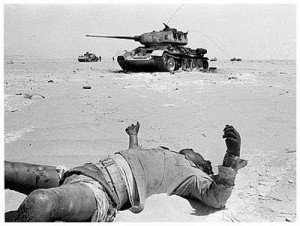 …by Lebanese poet, Musa Shu`ayb, about the 1967 defeat. Written in 1967 and translated/posted by As’ad at http://angryarab.blogspot.com/:
…by Lebanese poet, Musa Shu`ayb, about the 1967 defeat. Written in 1967 and translated/posted by As’ad at http://angryarab.blogspot.com/:
“For whom do I write?
Do I wrote about you,
o my homeland
Do I write my sadness and bitterness
and the hopes of millions
that were buried without coffins?
Do I write about our history
which is mixed with mold
and on a time
when we lived outside of time
For whom do I write?
If I sob, they would
say a mourning poet
And if I act stoic,
they would say:
a lying outbidder
For whom do I write?
My comrades are
sellers on the market
mercenary right-wingers
leftists on paper
For whom do I write?
And rats are around me
biting what I write…
Because living in my country
is without a price
People in my country die
without a price
I heard a song yesterday
I heard a song on the radio
praising the nation of the Arabs
sanctifying the revolt of flames
spilling over with the curse of eras
I was ashamed that I was
my father’s son
I read yesterday about a man
He is named Che Guevara
He was mourned in my homeland
People cried over his death
in my homeland
They told stories about him…
and said poetry about him
Not one, of the revolutionaries
of my homeland
threw away his cup of coffee
abandoned his girlfriend
ignored the hair of his beard
Not one revolutionary,
threw his chair on the floor
walked toward death
distorting the suns of the equator
in order that flags of liberty
fly over these lands…
For whom do I write?
For the generation of dancing
in dark rooms
for the sick of Hamra street
where the revolution is planned
for Guevara who was named
a legend in Lebanon
So that they appear blameless
he became a legend
And the days of legends
have long gone in this East
For whom do I write?
I will write for the refugees…
for those who carry the sins of
centuries
for those who wash the shame
of civilizations and the sinners
with hunger, nakedness,
tears, and blood
And no homeland except
wind of illusion
and no shelter except
the humiliation of tents
I will write for those who are tired
Sprinkling on their horizon
my exhausted poetry
and swearing by death…
I will not lie.”
PS — according to this post, Musa Shu`ayb was assassinated by agents of the Syrian regime in 1980.

2 comments
M d’N: There has been a lot of poetry quotation lately, not least nearly everyone’s quotation of TS Eliot’s The Hollow Men ending (and for some reason zillions of people think it’s from The Waste Land), “This is the way the world ends, / Not with a bang but a whimper” when characterizing the US ‘withdrawal’ from Iraq. What people in general don’t realize is that the line is actually
This is the way the world ends
This is the way the world ends
This is the way the world ends
Not with a bang but a whimper.
and it’s in italics … and the only other section of the poem that’s in italics is the burlesque version of the children’s song ‘Here we go ’round the mulberry bush’
Here we go round the prickly pear
Prickly pear prickly pear
Here we go round the prickly pear
At five o’clock in the morning.
… which is in italics precisely because it is either meant to be sung out loud when read, or the reader is being reminded that there is a melody for it. This in turn suggests that the reader’s attention is being drawn (or at least should be?) to the underlying melody/rhythm of the final verse … doesn’t that make the whole thing more risible, more jocular, than it is perceived to be? Surely the Nobel prize judges had to be unaware of this? Were you?
Thom Moore
Author
I was not. Nor can I say much about the sentience of those Nobel judges, other than to suggest that their “judgments” are often little more than an extravagant exercise in wishful thinking.